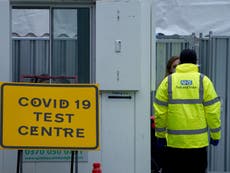Covid testing chaos: Only half of people with missing positive tests have been reached for their contacts
Health secretary refuses to confirm blunder caused by failure to create spreadsheets large enough
Your support helps us to tell the story
From reproductive rights to climate change to Big Tech, The Independent is on the ground when the story is developing. Whether it's investigating the financials of Elon Musk's pro-Trump PAC or producing our latest documentary, 'The A Word', which shines a light on the American women fighting for reproductive rights, we know how important it is to parse out the facts from the messaging.
At such a critical moment in US history, we need reporters on the ground. Your donation allows us to keep sending journalists to speak to both sides of the story.
The Independent is trusted by Americans across the entire political spectrum. And unlike many other quality news outlets, we choose not to lock Americans out of our reporting and analysis with paywalls. We believe quality journalism should be available to everyone, paid for by those who can afford it.
Your support makes all the difference.Matt Hancock admitted the fiasco over 16,000 missing Covid-19 positive test results is “ongoing”, with nearly half of cases yet to be reached to ask for their close contacts.
As anger grew over the blunder – caused by an extraordinary failure to create spreadsheets large enough to cope with all results – the health secretary was warned he was “putting lives at risk”.
Answering questions in the Commons, Mr Hancock refused to discuss details of the error, but appeared to pin the blame on Public Health England, referring to its “legacy system”.
He said the weakness had been recognised in the summer, with an upgrade ordered in August, but did not explain why the problem had continued through to October.
And, while arguing delayed contact tracing had begun “first thing Saturday”, he admitted only “51 per cent of the cases have now been contacted a second time for contract tracing purposes”.
Under questioning, he was unable to say when the remaining people – around 7,700 of the 15,841 unreported positive tests – would be reached and their contacts informed.
Jonathan Ashworth, the shadow health secretary, said around “48,000 contacts” had not been traced, warning: “Thousands of people blissfully unaware they have been exposed to Covid, potentially spreading this deadly virus.”
“This isn’t just a shambles, it’s so much worse,” he said, adding: “It’s putting lives at risk and he should apologise.”
Jeremy Hunt, the former Tory health secretary, urged Mr Hancock to turn to local councils for help, saying: “Isn’t the underlying problem here that the Lighthouse laboratories have been overwhelmed by demand?”
The criticism came as a further 12,594 coronavirus cases were announced in the previous 24 hours, after the backlog that caused Sunday’s spike was stripped out.
There are now 2,593 patients in hospital in England with the virus – the highest figure since the end of June – and 331 are on mechanical ventilation, up from 310 on Sunday.
Mr Hancock also hinted a new three-tier system is looming, to simplify local lockdown rules, promising to “update” MPs soon.
It was “critical” to have “more consistent approaches to levels of local action”, he said. The toughest tier is expected to mean the closure of pubs.
The results are thought to have been missed because an Excel spreadsheet containing lab results reached its limit and was unable to register an increase in positive tests.
At least one of the privately run Lighthouse labs is believed to have sent its daily test report to PHE as a CSV file – which was then loaded into Microsoft Excel, with the new tests at the bottom added to the main database.
But, while CSV files can be any size, Microsoft Excel files have a limit on rows, so that – when a longer CSV file is opened – the bottom rows are cut off and are no longer displayed.
IT experts were bemused by the decision to use Excel, rather than modern specialist software, and said the system should have been adequately tested.
“Many large organisations refer disparagingly to Excel-based applications as ‘end-user driven architectures’ and spend lots of time trying to decommission them for reasons relating to security, control and stability,” said Adam Leon Smith, fellow of BCS, the Chartered Institute for IT.
Jon Crowcroft, Marconi Professor of communications systems from the University of Cambridge, said file size should be a “basic consideration”.
“One would think that a software engineer would have considered a worst-case test scenario for any system design – on paper before you even get to writing code – just to make sure it wouldn’t blow up in any way like this,” he argued.
Although all the positive cases were informed, their details were not passed onto the tracing system – so they were not asked for their close contacts, for that work to begin.
The rate of new Covid-19 cases has now soared in many areas, including in Manchester – where 2,740 cases were recorded in the seven days to October 1, or 495.6 per 100,000 people, up from 223.2 per 100,000 in the previous week.
Mr Hancock said the weakness in the “PHE legacy system” had been recognised in the summer, with contracts for an upgraded system awarded in August.
Defending the government’s actions, he told MPs: “Outbreak control in care homes, schools and hospitals has not been directly affected, because dealing with outbreaks in these settings does not primarily rely on this PHE system.”
The assessment of the challenge of the pandemic has “not substantially changed” because of the data error, with no effects on local lockdown decisions.
“This incident should never have happened, but the team has acted swiftly to minimise its impact, and now it is critical that we work together to put this right and make sure it never happens again.”
Lucy Powell, a Labour MP in Manchester, urged Mr Hancock to recognise that the local lockdown strategy was not working, demanding an urgent “rethink”.
She pointed out that a ban on household mixing had been introduced when the city’s infection rate was only 10 per cent of the figure today.
“Residents in Manchester have been unable to see loved ones for over two months,” Ms Powell said. “If we are looking at another six months, this is no life for people to be living and it’s not sustainable or desirable.”






Join our commenting forum
Join thought-provoking conversations, follow other Independent readers and see their replies
Comments